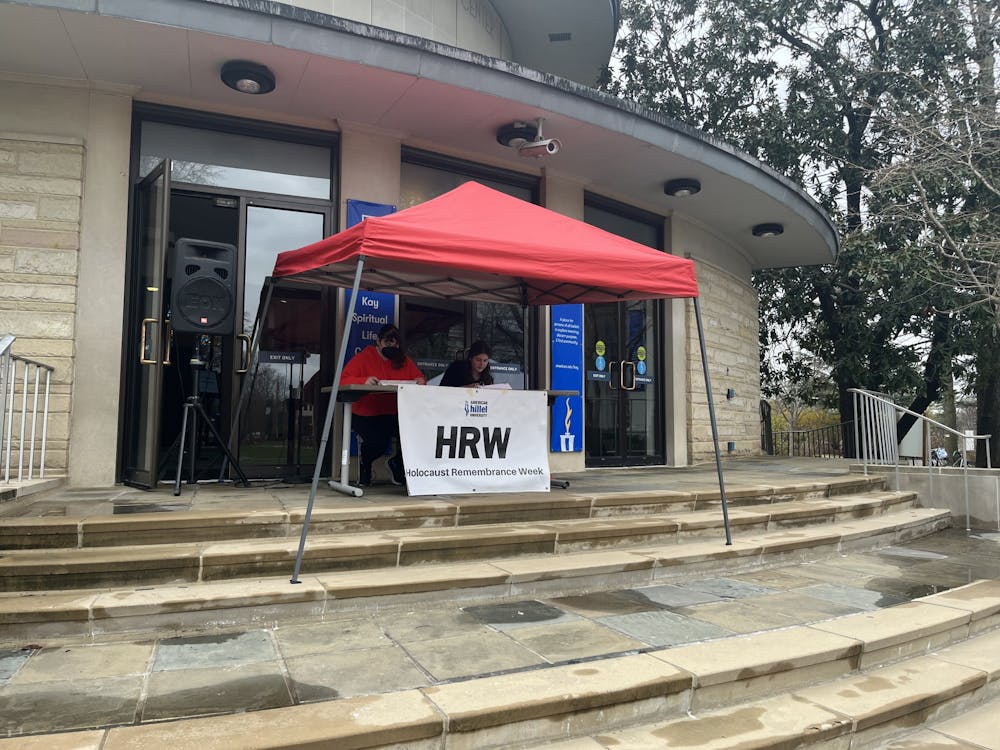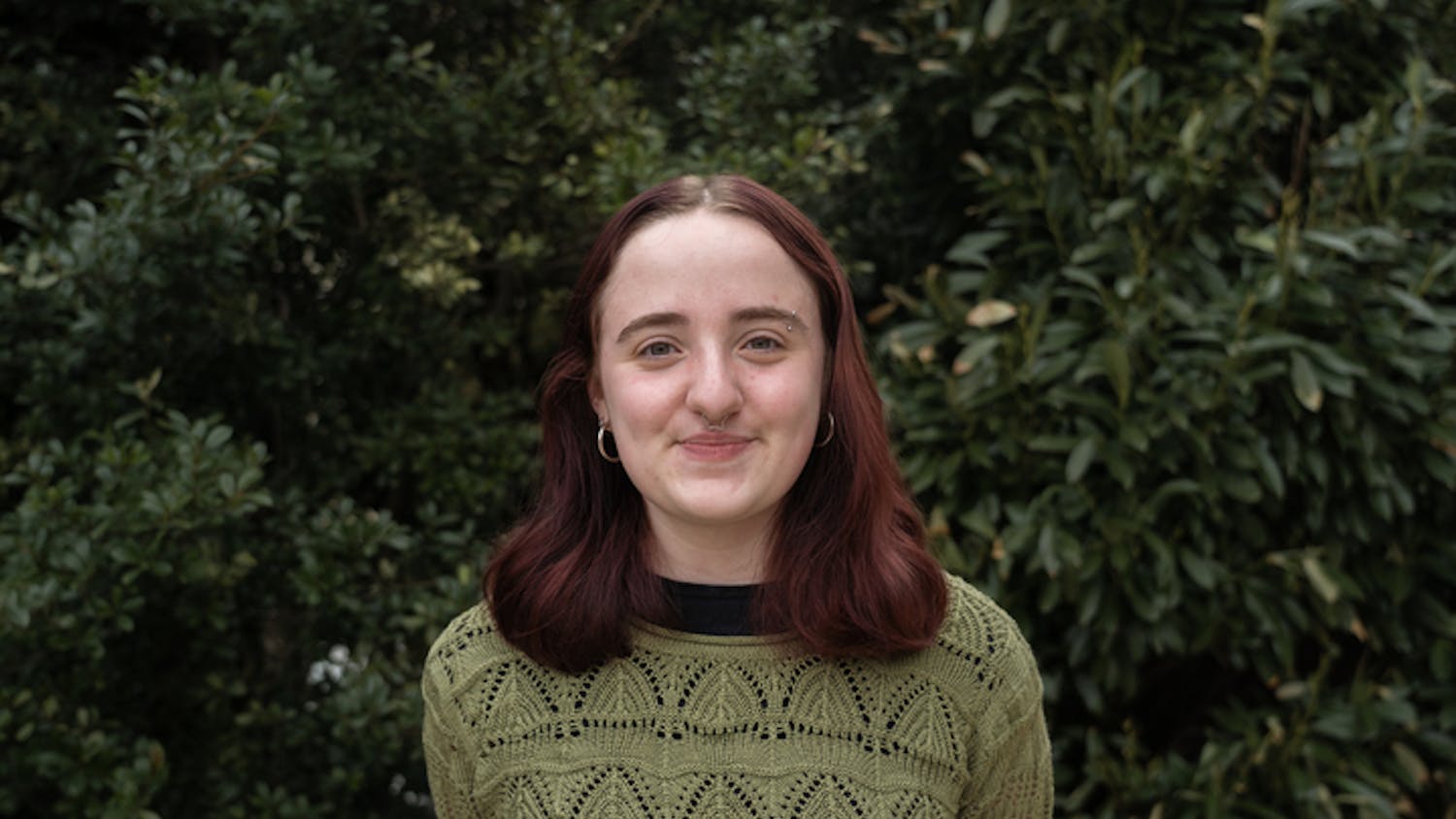Editor’s Note: Committee member Sara Winick, The Eagle’s music editor, was not involved in the writing, reporting, or editing of this story.
Students in American University’s Holocaust Remembrance Week planning committee encouraged the community to reflect on the impact of the Holocaust and promote support for all marginalized communities in a series of events hosted from April 4 to April 11.
Rachel Schiff, a senior in the Kogod School of Business who has worked on the planning committee since her freshman year and served as the chair this year, said that her team’s goal was to “raise awareness and gather allyship” with their programming, not only within the Jewish community but across all minority groups.
Antisemitism, Intersectionality, and Allyship panel discussion
Jewish studies scholars and College of Arts and Sciences professors Lauren Strauss and Pamela Nadell joined antiracist advocate TM Garret to discuss the deep-rooted global history of antisemitism and the process of reckoning with and addressing hateful rhetoric.
Nadell teaches a Complex Problems seminar called Antisemitism: Enduring Hatred and authored an account of Jewish women’s experiences in the United States titled “America’s Jewish Women: A History from Colonial Times to Today.” She said that it is critical to pay attention to the rise of antisemitic rhetoric in recent years.
“Antisemitism rises and falls, it lapses and it wanes, some people say it’s cyclical, some people say it’s not,” Nadell said. “What I would say is that antisemitism seems to surge in times of crisis and I could point to places in American history where we could say that and I think that in the current crisis moment that we feel that we've been in the United States for so many years now with tremendous political polarization in the country…antisemitism has used that as a moment where it can rear its ugly head again.”
Nadell added that, while most violent hate crimes are perpetrated by far-right organizations, many college students experience antisemitism from the political left.
“Anti-zionism, anti-Israelism has become a cover for what is often traditional antisemitism,” Nadell said.
Garret, who was previously active in white supremacist organizations, spoke to his experience as a former member of hate groups. He grew up in Germany, where he said he joked around about the Holocaust “for attention” before slowly being indoctrinated into a skinhead group.
“On the way into this forest of hate, at the beginning, it’s often very, very, let’s say ‘unintentional,’ like in my case, cracking the jokes,” said Garret, who emphasized the importance of calling out dehumanization tactics in order to prevent ignorance from escalating into hatred.
For Schiff, this event was an opportunity to address bigotry in all its forms.
“I think that an important thing of remembering the Holocaust and commemorating it is to make sure that it stays in people’s brains and they remember the history of it so that history doesn’t repeat itself,” Schiff said. “I mean, we see what’s going on in Ukraine and China and at our own borders, and while the Holocaust isn’t a comparable event to anything, it’s the same type of hatred that we see continuing.”
Descendents of survivors speak during event
On April 5, the HRW committee hosted a speaker event with the grandchildren of Holocaust survivors, Sandi Fox and Jeff Robins, who told the stories of their grandparents survival.
According to Fox, although she was always interested in the Holocaust, she did not know their stories until they had passed away.
“They didn't really like to talk about it, and it wasn't until my mom started asking my grandfather more questions … around the time he was going to be passing away, that we learned a lot more,” Fox said.
Fox’s grandmother, Suzanne, survived the Holocaust by being on one of the first rescued through the Kindertransport, which saved thousands of children in Nazi Germany.
Robins’ grandfather, Leo Zusman, was liberated from a concentration camp in 1945. His wife, young daughter and much of his immediate family did not survive.
“And yet, he managed to survive,” Robins said. “Our understanding is that he managed to survive by finding work and making himself essential. But he still keeps and kept the memory of his family with him.”
The event, which was held in the Wechsler Theater, featured an introduction given by HRW committee members Sara Winick and Jackson Mandel, as well as a question and answer session.
“When I found out about this opportunity to get trained to tell my own grandparents’ stories, I was like, ‘Okay, I'm doing this,’” Fox said. “I'm very against needles and tattoos, but eventually I actually want to get … the birthdates of my grandfather's two little sisters, one of them I’m named after, so that people will ask me, ‘what does that mean?’ So that I can tell their stories. Because I feel that is my role as the granddaughter, because they're no longer here to tell them.”
Schiff said this event was an effort to humanize Holocaust victims, making the atrocity “feel a little bit more real” for the University community.
“You’re putting this broad label, all the time, on six million individuals,” Schiff said. “So I think it’s important to break it down and you know, really share stories of individual people.”
Students participate in 24-hour name reading
On April 6, representatives from Hillel and other campus organizations took turns reading names of Holocaust victims aloud on the steps of the Kay Spiritual Life Center — an event that took 24 hours to complete.
Schiff described the activity as “incredibly meaningful,” noting that students continued reading names outside despite a rainstorm that occurred overnight.
“There’s something about being on campus when it’s dead and reading these names into a microphone and having it be broadcast to all of campus … I can’t even put it into words,” Schiff said.
According to Schiff, the HRW committee invites campus organizations that are not specifically Jewish-affiliated to sign up for name-reading shifts during this event, as well as any community members who happen to pass by the table. She said that, while some club representatives signed up to read names, many students were hesitant to participate in the activity.
“I think that’s something that either makes you more passionate and makes you more hungry to do this over and over again, to prove the importance and show people that this matters, and it could actually, you know, discourage you a little bit,” Schiff said. “I think that’s a tough thing that other groups face when they feel like they’re not getting support from their peers.”
Holocaust Remembrance Shabbat
To close out Holocaust Remembrance Week, the committee organized a special remembrance-themed Shabbat dinner. While Hillel hosts a Shabbat on campus every Friday, Schiff said this one was an attempt to honor those affected by the Holocaust during a cultural tradition that “most Jews, on some level, participate in.”
“That Shabbat in general is just kind of when you loosen your belt a little bit,” Schiff said. “You take a deep breath and you look back on the week and reflect and you’re like, ‘This is what I just did. This is why this was important to me.’ You look around the room and you see your peers that you share something with — like your Judaism, your relationship to religion even — and you realize why you did it.”
While Holocaust Remembrance Week is generally centered around the Jewish community, Schiff hopes that the committee’s programming inspires community members to “include different groups in their activism.”
“I do this for more than just my Jewish community,” Schiff said. “As a Jew, you know, we grow up learning that we have to be allies to other groups of people. That is our duty. That’s our calling … because of our own history, it is our duty to show up for other people.”





